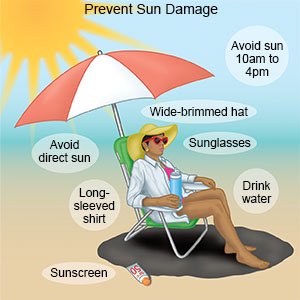Sunburn
Medically reviewed by Drugs.com. Last updated on Aug 4, 2025.
A sunburn is when your skin is damaged by exposure to ultraviolet (UV) radiation. UV radiation comes from sunlight and devices such as tanning beds.
DISCHARGE INSTRUCTIONS:
Return to the emergency department if:
- Your skin has many blisters, which break or bleed.
- You feel dizzy, weak, or faint.
- You have new headaches that do not go away with medicine.
- You have problems thinking or remembering things.
Contact your healthcare provider if:
- You have a fever.
- Your skin is red and itchy from the sunscreen.
- You have a new mole, or one that has changed color, shape, or size.
- Your skin and mouth are dry, and you feel very thirsty.
- You have questions or concerns about your condition or care.
Related medications
Treatment options
The following list of medications are related to or used in the treatment of this condition.
Medicines:
- Acetaminophen decreases pain and fever. It is available without a doctor's order. Ask how much to take and how often to take it. Follow directions. Read the labels of all other medicines you are using to see if they also contain acetaminophen, or ask your doctor or pharmacist. Acetaminophen can cause liver damage if not taken correctly.
- NSAIDs , such as ibuprofen, help decrease swelling, pain, and fever. This medicine is available with or without a doctor's order. NSAIDs can cause stomach bleeding or kidney problems in certain people. If you take blood thinner medicine, always ask your healthcare provider if NSAIDs are safe for you. Always read the medicine label and follow directions.
- Steroids decrease redness, pain, and swelling. This medicine may be given as a pill, or used as a lotion to rub on sunburned areas.
- Take your medicine as directed. Contact your healthcare provider if you think your medicine is not helping or if you have side effects. Tell your provider if you are allergic to any medicine. Keep a list of the medicines, vitamins, and herbs you take. Include the amounts, and when and why you take them. Bring the list or the pill bottles to follow-up visits. Carry your medicine list with you in case of an emergency.
Manage your symptoms:
- Apply a cool compress. A cool compress or wet towel can help soothe your skin.
- Take short baths or showers. Bathe or shower in lukewarm water. Add oatmeal, baking soda, or cornstarch to the bath water to help reduce skin irritation.
- Use lotions or gels to keep your skin moist. These include products such as aloe vera, petroleum jelly, or ointments. These may help cool your skin and decrease pain and redness. Ask which products would be best for you to use.
- Drink liquids as directed. This will help prevent dehydration. Ask which liquids are best for you and how much liquid to drink each day.
Prevent another sunburn:
 |
- Wear sunscreen with an SPF of 15 or higher. Put sunscreen on 15 to 30 minutes before you go outside, and again every 2 hours. You will need to put sunscreen on again after you swim, sweat, or dry yourself with a towel.
- Wear clothing that will block UV rays. This includes dark, loose clothing made of a tight weave fabric. Pants, long-sleeved shirts, wide-brimmed hats, and sunglasses also help block UV rays.
- Stay indoors between 10 AM and 3 PM. This will help you avoid the highest concentrations of UV rays.
- Limit exposure. Do not stay outdoors or in tanning beds for long periods.
- Ask about vitamin supplements. Vitamins A, C, and E may help protect your skin against UV radiation.
Follow up with your doctor as directed:
Write down your questions so you remember to ask them during your visits.
© Copyright Merative 2025 Information is for End User's use only and may not be sold, redistributed or otherwise used for commercial purposes.
The above information is an educational aid only. It is not intended as medical advice for individual conditions or treatments. Talk to your doctor, nurse or pharmacist before following any medical regimen to see if it is safe and effective for you.
Learn more about Sunburn
Treatment options
Care guides
Further information
Always consult your healthcare provider to ensure the information displayed on this page applies to your personal circumstances.
